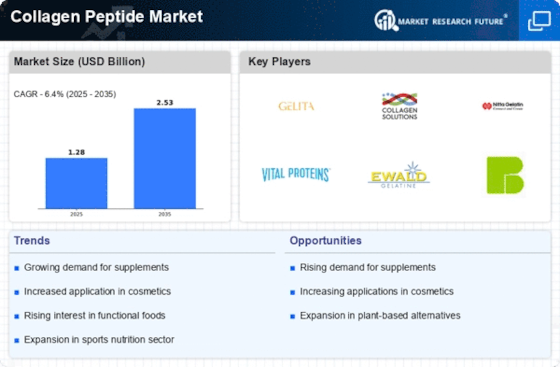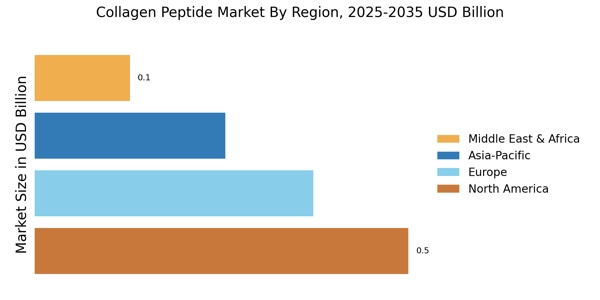Expansion of Application Areas
The expansion of application areas for collagen peptides significantly influences the collagen peptide Market. Beyond traditional uses in dietary supplements, collagen peptides are increasingly being integrated into various sectors, including cosmetics, pharmaceuticals, and food and beverages. For instance, the beauty industry has seen a notable rise in collagen-infused skincare products, which are marketed for their anti-aging properties. Additionally, the food sector is witnessing innovations with collagen-enriched snacks and beverages. This diversification not only broadens the consumer base but also enhances the market's potential, as it caters to different demographics and preferences, thereby driving growth in the Collagen Peptide Market.
Rise of E-Commerce and Online Retail
The rise of e-commerce and online retail platforms is reshaping the landscape of the Collagen Peptide Market. With the increasing preference for online shopping, consumers have greater access to a variety of collagen products, ranging from supplements to beauty items. This shift not only enhances convenience but also allows for a broader reach of niche products that may not be available in traditional retail settings. Data suggests that online sales of health and wellness products, including collagen peptides, are experiencing rapid growth. As e-commerce continues to expand, it is likely to play a crucial role in driving sales and increasing market penetration for the Collagen Peptide Market.
Growing Interest in Anti-Aging Products
The growing interest in anti-aging products is a significant driver for the Collagen Peptide Market. As populations age, there is an increasing demand for products that promote youthful skin and overall vitality. Collagen peptides are often marketed for their ability to improve skin hydration, elasticity, and reduce the appearance of wrinkles. This trend is particularly pronounced among millennials and Gen Z consumers, who are becoming more proactive about skincare. Market data indicates that the anti-aging segment is one of the fastest-growing categories within the beauty and wellness sectors, further propelling the demand for collagen peptides. This trend underscores the potential for sustained growth in the Collagen Peptide Market.
Increasing Awareness of Health Benefits
The rising awareness regarding the health benefits of collagen peptides is a pivotal driver in the Collagen Peptide Market. Consumers are increasingly informed about the role of collagen in skin elasticity, joint health, and overall wellness. This awareness is reflected in the growing demand for dietary supplements and functional foods that incorporate collagen peptides. According to recent data, the market for collagen supplements is projected to reach substantial figures, indicating a robust growth trajectory. As consumers prioritize health and wellness, the Collagen Peptide Market is likely to experience a surge in product offerings that cater to these needs, including powders, capsules, and fortified foods.
Technological Advancements in Production
Technological advancements in the production of collagen peptides are transforming the Collagen Peptide Market. Innovations in extraction and processing techniques have led to higher purity and bioavailability of collagen peptides, making them more appealing to consumers and manufacturers alike. Enhanced production methods also contribute to cost efficiency, allowing for competitive pricing in the market. As a result, companies are better positioned to meet the increasing demand for high-quality collagen products. Furthermore, these advancements may lead to the development of novel collagen formulations, potentially expanding the market further. The ongoing research and development in this area suggest a promising future for the Collagen Peptide Market.


















